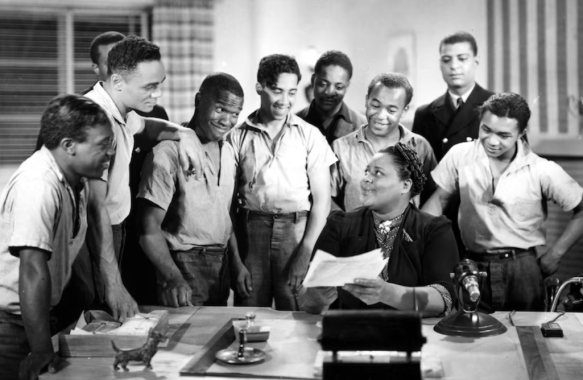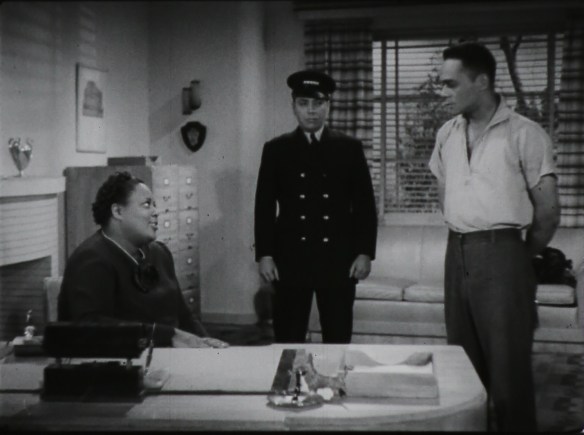In 2011, I announced I was trying to see every film released in 1939. This new series chronicles films released in 1939 as I watch them. As we start out this blog feature, this section may become more concrete as I search for a common thread that runs throughout each film of the year. Right now, that’s difficult.
 1939 film:
1939 film:
Reform School (1939)
Release date:
April 27, 1939
Cast:
Louise Beavers, Reginald Fenderson, Eugene Jackson, Freddie Jackson, Eddie Lynn, DeForest Covan, Bob Simmons, Monte Hawley, Maceo Bruce Sheffield, Milton Hall
Studio:
Million Dollar Productions, Inc.
Director:
Leo C. Popkin
Plot:
Since he went to reform school, Eddie (Fenderson) has a hard time finding work and turns to crime. Probation officer Mother Barton (Beavers) tries to help Eddie and the other young people in reform school by demanding for better treatment in reform school and education for society that these young people aren’t hardened criminals when they are released from reform school. When Eddie is mistreated by the superintendent at the reform school, Mother Barton takes him to task and is appointed the head of the institution.
1939 Notes:
• Only film of Bob Simmons and Milton Hall.
• By the numbers:
– Louise Beavers was in three films released in 1939.
– Reginald Fenderson was in one film released in 1939.
– Eugene Jackson was in five films released in 1939.
– Freddie Jackson was in three films released in 1939.
– DeForest Covan was in five films released in 1939.
– Eddie Lynn’s first film and only film of 1939. He was only in two feature films, with his last film in 1942.
– Monte Hawley was in three films released in 1939.
– Maceo Bruce Sheffield was in two films released in 1939.

Other trivia:
• The film was retitled as “Prison Bait” and re-released in 1944.
• Eugene Jackson, DeForrest Covan, Eddie Lyon and Bob Simmons were billed as the comedic “Harlem Tuff Kids.”
• The film was thought to be lost. It was restored by the Academy Film Archive in 2019, according to film historian and TCM host Jacqueline Stewart.
• Louise Beavers went on a personal appearance tour to promote the film.

My review: Searching for the “1939 feature”:
There’s something very special about “Reform School” (1939).
For starters, this film was considered to be lost and we now have the privilege to watch it, thanks to a 2019 restoration. Most importantly, it’s a rare leading role for the wonderful actress, Louise Beavers.
Film historian and TCM host Jacqueline Stewart said this role is a departure from the roles Beavers usually played, such as in “Imitation of Life” (1933). It truly is and it’s glorious.
Beavers’s character is kind, warm, intelligent and ready to fight for major changes needed in reform schools. She’s also quite fashionable in fur coats and hats.
“Reform School” is known as a “race film,” starring an all-Black cast for segregated audiences. Produced between the dawn of film through the early 1950s, these films were produced outside of major Hollywood studios.
In the “Reform School,” Beavers plays Mother Barton, a parole officer who is frustrated that young men released from reform school often fall back into a life of crime, because they can’t find jobs elsewhere. When she visits the reform school leaders, she learns that their methods are treating the young men with brute force, rather than teaching responsibility and to learn a trade. She also wants to educate the public that those released from reform school aren’t hardened criminals and that they should be employed.
The last straw is when Mother Barton finds that one of her parolees — Eddie (Reginald Fenderson) — has been beaten as punishment and is ill in his cell.
Mother Barton takes the current reform schools to task and takes her demands to the courts. When the superintendents and their brutal practices are exposed, Mother Barton is appointed the head of the reform school.
But it doesn’t end there — with her practices to teach the young men responsibility and be on an “honor system,” the guards resist her practices and the young men think they can trick her. Rather than clubs and guns, Mother Barton enforces her rules in a less violent-but potent manner — with castor oil (I love a good ole castor oil joke. They should bring those back). However, Mother Barton and the young men, run into more trouble when one of the guards — angry about the changes — tries to get even.
Louise Beavers is so good in this film, especially in the scene where she is speaking sternly to the reform school superintendents asking them if they actually know what reform means. I also like her speech over the radio, where she sounds like she gets choked up and is overcome with happiness.
Prison and reform school change was a big topic of 1930s films (for example: Invisible Stripes, Boy Slaves were also released in 1939). Many focus on not being able to “go straight” and get jobs when released into the outside world, causing them to continue a life of crime. “Reform School” is an interesting look at how transforming how juveniles are treated in reform school institutions is met by opposition not only by leaders, but also the young people in the institution.
What I really liked about this film, is that sometimes race films still include racial stereotypes of the day. Other than perhaps a dancing moment, I didn’t spot anything like I did in other films.
I really enjoyed this film, especially as we saw the montage of the changes went on at the school. But most of all, my favorite was seeing Louise Beavers in a lead role. Three cheers for Louise Beavers!
Check out the Comet Over Hollywood Facebook page, follow on Twitter at @HollywoodComet or e-mail at cometoverhollywood@gmail.com
